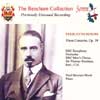Busoni Piano concerto op 39
A major pianist voice heard down the years in Busoni’s epic
View record and artist detailsRecord and Artist Details
Composer or Director: Ferruccio (Dante Michelangiolo Benvenuto) Busoni
Genre:
Orchestral
Label: Somm Recordings
Magazine Review Date: 10/2003
Media Format: CD or Download
Media Runtime: 69
Mastering:
Mono
ADD
Catalogue Number: SOMM-BEECHAM15

Tracks:
| Composition | Artist Credit |
|---|---|
| Concerto for Piano and Orchestra |
Ferruccio (Dante Michelangiolo Benvenuto) Busoni, Composer
BBC Chorus BBC Symphony Orchestra Ferruccio (Dante Michelangiolo Benvenuto) Busoni, Composer Noel Mewton-Wood, Piano Thomas Beecham, Conductor |
Author: Bryce Morrison
Whether you view the Busoni Piano Concerto, most daunting of all concertos, as a ‘skyscraper’(Busoni himself) or ‘pandemonium let loose’ (Edward Dent), there can be little doubt that this five-movement masterpiece, complete with male chorus in the finale, blazes with a unique and engulfing genius.
Not surprisingly, the skeletons in the cupboard are two composers dear to Busoni’s often frighteningly austere heart: Alkan, whose most massive quasi-orchestral works were written for solo piano, and Liszt, most notably in the dark-hued irony and prophecy of his later works. There is also the shadow of the Tarantella from Venezia e Napoli where traditional blandishments and, indeed, cliched Neapolitan gaiety are turned topsy-turvy and seen, as it were, through a distorting mirror. The long and elegiac Pezzo serioso at the core of this massive work resounds with funeral bells and just when all seems resolved in what Ronald Stephenson (always among Busoni’s most ardent champions) has called ‘a mystic hymn’ (‘Lift you your hearts to the Eternal Almighty’), the music ends in ‘a gesture of despair but not of exhausted invention’ (Stephenson, again).
Any evidence of Noel Mewton-Wood’s tragically brief life and career is welcome, even when you have to listen to his magisterial and scintillating performance through a 1948 murk and poor balance that muffle and qualify his typically impetuous stride at his first entry, which should sound fortissimo and molto robustamente. Elsewhere, you sense rather than fully realise his charisma at 6'13" in the ironically named Pezzo giocoso or in his response to demands for lusingando un poco appassionato, fantasticamente and tempestoso, tuonando. Nothing is beyond his formidable powers.
Beecham (who engaged Mewton-Wood for his first London concerto appearance) is magnificently, even outrageously, to the fore and his sympathy for Busoni’s idiom is never in doubt. But those for whom sound counts most will have to look elsewhere: to John Ogdon whose name is inseparable from this concerto, and, more recently, to Garrick Ohlsson and Marc André-Hamelin; and to Peter Donohoe whose electrifying live performance at the Proms in 1988 (1/91), on EMI, should be reissued without delay. Somm’s presentation, too, is weak, including an undistinguished accompanying essay and an appreciation of Mewton-Wood by Andrew Porter published in Gramophone in 1954, long past its sell-by date.
Not surprisingly, the skeletons in the cupboard are two composers dear to Busoni’s often frighteningly austere heart: Alkan, whose most massive quasi-orchestral works were written for solo piano, and Liszt, most notably in the dark-hued irony and prophecy of his later works. There is also the shadow of the Tarantella from Venezia e Napoli where traditional blandishments and, indeed, cliched Neapolitan gaiety are turned topsy-turvy and seen, as it were, through a distorting mirror. The long and elegiac Pezzo serioso at the core of this massive work resounds with funeral bells and just when all seems resolved in what Ronald Stephenson (always among Busoni’s most ardent champions) has called ‘a mystic hymn’ (‘Lift you your hearts to the Eternal Almighty’), the music ends in ‘a gesture of despair but not of exhausted invention’ (Stephenson, again).
Any evidence of Noel Mewton-Wood’s tragically brief life and career is welcome, even when you have to listen to his magisterial and scintillating performance through a 1948 murk and poor balance that muffle and qualify his typically impetuous stride at his first entry, which should sound fortissimo and molto robustamente. Elsewhere, you sense rather than fully realise his charisma at 6'13" in the ironically named Pezzo giocoso or in his response to demands for lusingando un poco appassionato, fantasticamente and tempestoso, tuonando. Nothing is beyond his formidable powers.
Beecham (who engaged Mewton-Wood for his first London concerto appearance) is magnificently, even outrageously, to the fore and his sympathy for Busoni’s idiom is never in doubt. But those for whom sound counts most will have to look elsewhere: to John Ogdon whose name is inseparable from this concerto, and, more recently, to Garrick Ohlsson and Marc André-Hamelin; and to Peter Donohoe whose electrifying live performance at the Proms in 1988 (1/91), on EMI, should be reissued without delay. Somm’s presentation, too, is weak, including an undistinguished accompanying essay and an appreciation of Mewton-Wood by Andrew Porter published in Gramophone in 1954, long past its sell-by date.
Discover the world's largest classical music catalogue with Presto Music.

Gramophone Digital Club
- Digital Edition
- Digital Archive
- Reviews Database
- Full website access
From £8.75 / month
Subscribe
Gramophone Full Club
- Print Edition
- Digital Edition
- Digital Archive
- Reviews Database
- Full website access
From £11.00 / month
Subscribe
If you are a library, university or other organisation that would be interested in an institutional subscription to Gramophone please click here for further information.





